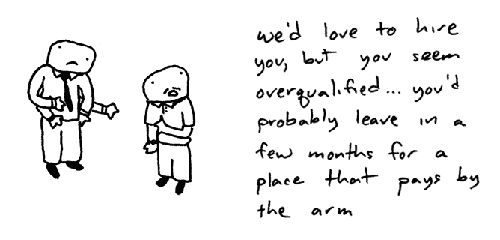
Congratulations! You’ve successfully completed college/high school/associate’s degree/technical school/doggy day care/a day without curling into a useless ball of tears and self pity! You are finally ready to go out there and get one of them full-time professional jobs with benefits and everything. You’ve studied hard in school, and have even spoken with professionals in your field about what to expect in your career. You couldn’t be more prepared to hit the ground running and jump straight to the top. Except there are a few things that no one is going to tell you about starting out in the working world. So let’s proceed to crush dreams and break hearts with the cold hammer of real world business.
People Lie

You obviously know that people will lie to get what they want. That has been a fact of life since you were first able to speak. You’ve also probably seen Wall Street and know a thing or two about sleazy businessmen and their tendency to twist every fact to their advantage. Maybe you’ve even developed a healthy ability to bend the truth when it suits you. Nothing Earth-shattering — you’re not a maniac, but the little white lie here and there to grease the wheels. That’s cute. You’re going to need that later.
Unless you’ve been raised by sociopaths and pathological liars, in your first job in business, you will be completely unprepared for how often people will lie to you and misrepresent the facts. It’s not even their fault, really. When your entire livelihood can easily swing 30% up or down depending on how much you tart up your performance and how much you tell the boss how amazing they are, it just becomes second nature after a while to maintain a thin, slimy sheen of mendacity.
That is not to say you shouldn’t strive to be honest and forthright with your coworkers and clients, just be ready to always ask for evidence to corroborate claims, and be ready to wade through the inevitable bullshit smokescreen that will pop up when you do.
People Lie Without Realizing It

You’re ready for the really bad liars, the ones who will smile and shake with one hand while shanking you in the ribs with the other. Great. But you should know that those people aren’t the worst type of liars you’ll meet in your first job. In fact, they’re rather benign after you become accustomed to them. Bald-faced lies tend to be obvious after some investigation, and once someone tries to pull those sorts of lies, you know exactly where they stand. They’re dangerous, but at least they’re a known quantity. The most dangerous liars are the people who are so self-deluded that they don’t even know they’re lying (which I guess technically doesn’t make it lying, just stupidity).
A perfect example of this type of coworker that you undoubtedly will encounter during your first job is the “Perpetual Raise” boss. Typically they will say something about performance reviews in 6 months and the possibility of a raise because of that. They might even tempt you with grand tales of yearly bonuses, stock options, and completely unrealistic ranges to which your salary could rise. The thing is, they actually believe this, and they actually plan on making it happen. But because they’re running a business, they inevitably can never find the money — and when they do it likely will go to something else the business needs more than that 5-figure salary bump you were expecting. Another example is the “You Are Essential to this Business!” boss, which can roughly be translated as “You Aren’t. But it Would be a Hassle to Replace You.”
Some People Are Needlessly Cruel

Theoretically a business is a business and should be conducted according to business principles. This will require you to be more ruthless and coldly calculating than you are normally used to. Capitalism isn’t the most morally upright system in the world, but at least it makes sense and ruthless things are done in the name of greater efficiency and better market outcomes. This is all true and well and good, but much like with democracy or sausages, if you like capitalism you should never watch it being made. The process is ugly and full of varied personalities, many of which are calm, professional and intelligent. And then there are the people who are just plain mean for no good reason.
Let’s put it this way: your average CEO is four times more likely to be a psychopath than the general population. They are likely in power because their complete lack of empathy and compulsive need to dominate allowed them to rise above competitors. They may be intelligent and very good at their jobs, but let’s be perfectly clear: they’re still psychopaths, and you still have to deal with them. They will be cruel, ruthless people who will yell at you and degrade you simply because they can. Literally all they enjoy in the world is hurting other people and possibly money but only insofar as it buys them power to hurt more people. And one day this type of person will either be your boss, or a client, or someone you have to deal with, so best to gird your loins now.
Some People Are Nicer Than You Expected

So by now you might have an image of your first office job as a never-ending hell hole full of liars, cheats, dullards and murderous psychopaths. The bad news is that this is true. There’s no getting around the fact that a sector built around power, greed and near-totalitarian governing structures is going to attract some of the worst of humanity. And to be fair, some of this has been hyperbole for the purpose of driving home a few points. So let’s talk about something about your first job to look forward to: you will make some of the best friends of your life.
In your first job you are at the bottom of the Totem pole. Or, more appropriately, at the bottom of the poop-chute. All of the blame, terrible assignments, long hours, and working during holidays will fall on your shoulders. Fortunately, you are unlikely to be alone. Either you will have coworkers at your level, or immediate supervisors who have been in your shoes. You will likely work with these people for a minimum of 1-2 years, seeing them almost every day for at least 8 hours a day (likely a hell of a lot more). You will see them more than you see your friends or your family. Almost inevitably, you will become friends with one or two of them, and that will be one of the few bright spots during your first job. Also you can play drunken office football with them after hours, which rules.
Someone Needs to Know Your Name

A lot of people start their first jobs with the adorably naive view that if they simply keep their heads down and do good work, raises and promotions will inevitably come their way. Now, surely, good performance is an important criteria for advancement and pay raises. And regular performance reviews by a company can help ensure that valuable employees receive their due credit. But real promotions to that one position right above yours that you are imminently qualified for come up only once in a while.
At that point, a bunch of people sit down in a room and have a conversation. Whether or not your name comes up in that conversation has a lot more to do with how well the people in the room know you than your performance up to that point. Think of your performance as gas—you either have it or you don’t. How well you’ve self-promoted yourself to the decision-makers determines whether you’re 9-series or just an extremely dependable Honda Civic. You don’t have to lie or shamelessly self-promote, but demonstrating drive, ambition, and initiative—and making sure that your coworkers and superiors know you’re on the lookout for the next big thing—is the best way to ensure you aren’t consistently passed over for promotion.
Your First Job is Not Your Destiny

This point is a touch more metaphysical than the others, but it needs to be said nonetheless. In a job market that can be so competitive you feel like you won’t be able to excel since you didn’t start at age 15, it’s easy to lose perspective. If you didn’t have an internship at the firm you’re working at before graduating, odds are there is someone who did and they’re likely your superior. People who have been with the company for 30 years have barely risen above Director-level positions, if that. You needed a head start in the 1980s if you really want to succeed.
Time makes fools of us all. It’s not time that determines how far you go in a company, it’s how good you are at your job (and that includes promoting your successes to superiors). There are people who will be at companies for 30-40 years still working as a manager, while the CEO has been there for only 15 years. On top of that, if you’ve locked yourself into an industry you realize you don’t enjoy, leaving it will only save you time and ensure future success. What is grad school for anyway if not avoiding the real world?
Always be Looking for Another Job

It may seem like a lot of work, and it may seem disingenuous, but you should never stop looking for a better job than the one you have. There are a few reasons behind this. First of which is that, being at the bottom of the pole, you are going to be the first laid off in any sort of firing-spree. It’s the basic last-one-in-first-one-out rule. Second, even if there aren’t any massive lay offs on the horizon, you never know when something might blow up in your face, or a harmless attachment turns out to be a network-disrupting virus. Third, the primary way that workers just starting out in the industry increase their wages and advance in position is through switching jobs—not promotions.
On top of these reasons, it never hurts to practice your interview skills and get a feel for where the market is heading. If your job description suddenly begins to include proficiency with SQL across the industry, you’ll be ahead of the curve in learning it. Finally, knowing what you’re worth is a powerful negotiating tool when it comes time to discuss raises. And the ability to walk out because you have a better offer is the ultimate bargaining chip in negotiations.
You’re Going to Feel Overqualified at Times

First jobs in business always seem to progress along the same gamut of negative emotions. It starts with anxiety that progresses to fear that progresses to boredom. You’re anxious about your responsibilities and meeting expectations. You’re stricken with fear as projects mount up and deadlines approach and you feel overwhelmed. You’re suddenly bored as you quickly master entry-level work. And then months pass with only the occasional exciting and challenging project.
Everyone will warn you to be prepared and expect to work hard at your first job to set yourself apart. That is good advice, but few people will tell you that the harder part will be maintaining interest and enthusiasm as all the interesting projects or parts of projects are handed off toe senior staff, while you all-to-frequently get stuck with performing rote regressions or even data entry. This is how the business ecosystem works. The best way to deal with it is to pack some snacks, stock up on coffee to keep you awake, and follow the next piece of advice:
Turn Mundane Work Into Something that Gets Noticed

At the bottom rung of the ladder, you’re often going to get the most boring parts of projects. Making phone calls, entering data, fetching coffee, who knows. It’s quite likely that this will constitute almost all the work you will get for the first year or so. Doing this work well, on time and to specifications is your job description, and it will, at the very least, not get you fired. But they also will not get you noticed. Often there’s a sort of double-speak that you’ll slowly get the handle of once you progress in the corporate world, but here’s a quick one to give you a leg up: when your boss says they want above-average work, what they really mean is they want above average work, plus something unexpectedly good.
In that vein, it’s best to always be looking for some way to deliver unexpected and insightful results. For example, if you’re an analyst who is asked to perform some simple regressions, do them and deliver your results plus, say, an extra analysis on the heteroskedasticity of the data. If you’re a writer doing an article about the local community center, call up local historians to add flavor to the piece. Doing good work is essential to eventually progressing; doing something different is what will make it actually happen.
You Will Die a Little Inside

There’s no way to sugar coat it: capitalism is pretty brutal at times and forces us to act in ways that would be considered heartless and cold outside of an office. Even at an entry-level position, you will eventually have to make decisions and recommendations about, say, the necessity of certain departments in a client’s firm. In just about any position, you may eventually have to argue for your necessity over one of your trusted coworkers. In a few years, it’s likely you’ll be in a position where you have to lay off or fire employees.
These things are pretty obvious, and almost fall into the stock advice you’d get going into the business world (or just about any job for that matter—but it’s always amplified in an office). Some of these actions make you feel hollow and like a bad person, since you are rarely forced to do anything so harsh in your personal life. There’s no real solution to this, no matter how many times people will tell you it’s better for the world as a whole for everyone to act like selfish capitalists or that it’s this fierce will that leads to life-changing and saving innovation. Recognizing it is for the best is logical and intelligent, but not denying that it feels awful nonetheless shows that you are still emotionally grounded, and won’t enter into such serious considerations lightly in the future. This is a valuable compass to have once you land that second job.